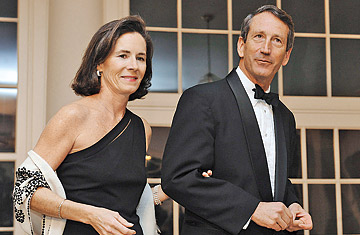
South Carolina Governor Mark Sanford arrives with his wife Jenny at a White House dinner held by President Obama for the National Governors Association on Feb. 22, 2009
(3 of 7)
The growing tendency of the poor to have children before marriage--the vast majority of unmarried women having babies are undereducated and have low incomes--is a catastrophic approach to life, as three Presidents in a row have tried to convince them. Bill Clinton's welfare-to-work program encouraged marriage, George W. Bush spent millions to promote marriage, and Barack Obama has spoken powerfully on the need for men to stay with their children: "We need fathers to step up, to realize that their job does not end at conception; that what makes you a man is not the ability to have a child but the courage to raise one."
The reason for these appeals to lasting unions is simple: on every single significant outcome related to short-term well-being and long-term success, children from intact, two-parent families outperform those from single-parent households. Longevity, drug abuse, school performance and dropout rates, teen pregnancy, criminal behavior and incarceration--if you can measure it, a sociologist has; and in all cases, the kids living with both parents drastically outperform the others.
Few things hamper a child as much as not having a father at home. "As a feminist, I didn't want to believe it," says Maria Kefalas, a sociologist who studies marriage and family issues and co-authored a seminal book on low-income mothers called Promises I Can Keep: Why Poor Women Put Motherhood Before Marriage. "Women always tell me, 'I can be a mother and a father to a child,' but it's not true." Growing up without a father has a deep psychological effect on a child. "The mom may not need that man," Kefalas says, "but her children still do."
This turns out to be true across the economic spectrum. The groundbreaking research on the effects of divorce on children from middle- and upper-income households comes from a surprising source: a Princeton sociologist and single mother named Sara McLanahan, who decided to study the fates of these children with the tacit assumption that once you control for income, being part of a single-parent household does not adversely affect kids. The results--which she published in the 1994 book Growing Up with a Single Parent: What Hurts, What Helps--were surprising. "Children who grow up in a household with only one biological parent," she found, "are worse off, on average, than children who grow up in a household with both of their biological parents, regardless of the parents' race or educational background."
